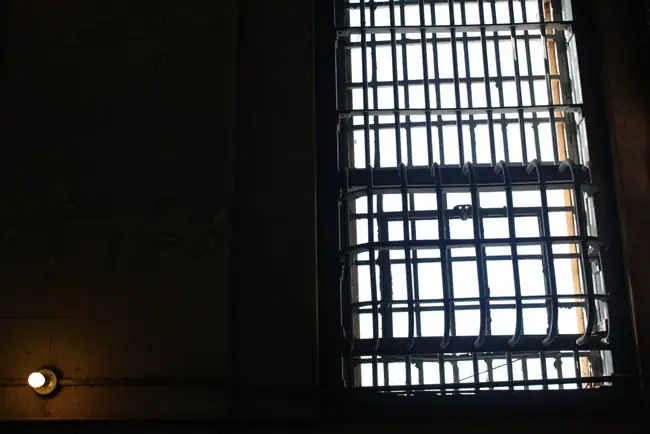
Libero Della Piana
At 36, Marcus White has spent half of his life in prison. Today he’s no longer behind bars, but now he’s imprisoned by something else: debt.
When White was sentenced, he was saddled with $5,800 in criminal fines and fees. By the time he was released, he was stunned to learn that with interest, his debt had grown to $15,000 — and continues to grow even now.
That debt isn’t just a drag on White’s finances. It’s a drag on his right to vote.
White’s not alone. More than 50 years after the 24th Amendment made poll taxes unconstitutional in the United States, formerly incarcerated people in at least 30 states are still barred from voting because they’re unable to fully pay their court-related fines and fees.
“I have completely changed my life and have been given a fresh start,” White said recently at a conference in Washington D.C. “Voting wasn’t important to me before, but now I want to be a productive citizen in every way… I want a voice in the process.”
“I am accountable for everything I have done,” he said. “But the interest rate on my fines is crazy.”
New research by my organization, the Alliance for a Just Society, shows that millions of people — including an estimated 1.5 million African Americans — are blocked from voting because they can’t afford their criminal debt.
That debt starts at sentencing and can grow at interest rates of 12 percent or more while inmates serve their sentences. It continues to grow after they’re released and face the numerous barriers to finding work and housing.
Some states explicitly require that all court-imposed fees are paid before voting rights are restored. Others are more indirect, requiring the completion of probation or parole — with the payment of fees and fines a condition of completing parole. The laws vary, but the effects are the same.
 On the other hand, former offenders with wealthier family or friends, or a savings account, are able to quickly regain their voting rights. The result is a two-tiered system that restores voting rights to an affluent elite and leaves the rest — the majority, in fact — without a vote.
On the other hand, former offenders with wealthier family or friends, or a savings account, are able to quickly regain their voting rights. The result is a two-tiered system that restores voting rights to an affluent elite and leaves the rest — the majority, in fact — without a vote.
The reality of racism in the United States and the criminalization of poverty means that black people and other people of color are more likely to be arrested, convicted, and locked up for longer than whites. Blacks are also less likely to regain their right to vote once they’re released.
That racial disparity bears a grim resemblance to the poll taxes imposed throughout the South after the Civil War, which were intended to keep newly freed black people from exercising their civil rights.
The problem has worsened since 2013, when the Supreme Court gutted the Voting Rights Act of 1965. Many states — including several in the old Confederacy — have since rushed to impose restrictive voter ID laws and other impediments to voting. But debt as a barrier to voting remains a little-known reality.
The clearest solution is to automatically restore voting rights to formerly incarcerated people, and to register everyone immediately after they complete their sentence. Alternately, lawmakers could repeal all criminal disenfranchisement. Short of that, states should simply remove the payment of court debts as a condition for voting.
Many of us take voting for granted, especially in a presidential election year.
Voting means having a say in the policies that affect your life and community. It’s an opportunity to elect those who will represent your values. Voting is actively participating in a better future.
Voting is hope. And the ability to pay should never be a requirement for that.
![]()
 Libero Della Piana leads racial justice and criminalization initiatives for the Alliance for a Just Society, where he is the digital director. He previously worked as a senior researcher and trainer for the Applied Research Center (now Race Forward) and was the Digital Director of the People’s World progressive news site. Libero received the prestigious Bannerman Fellowship for Young Activists of Color in 1997. He lives in East Harlem, New York.
Libero Della Piana leads racial justice and criminalization initiatives for the Alliance for a Just Society, where he is the digital director. He previously worked as a senior researcher and trainer for the Applied Research Center (now Race Forward) and was the Digital Director of the People’s World progressive news site. Libero received the prestigious Bannerman Fellowship for Young Activists of Color in 1997. He lives in East Harlem, New York.






























Outsider says
Once again, the Democrats are looking to secure more votes from ex-convicts, in addition to importing them by the millions from other countries, to secure their power for decades. Why Is it that Dems belittle Trump supporters for being mostly blue collar workers without a college degree, but seem to have no problem counting drug dealers, rapists and murderers among their supporters?
The Truth says
Once again, systematical oppression of the poor and less powerful. Said it once and will continue to say it. Americans have been brainwashed to believe their guns and their vote is what makes them distinct. Setting up laws from early on to easily criminalize Felony, Felony, Felony, was and is money in the bank for those who really control things. Criminalize you, no gun for you, (I really don’t care about a gun) no vote for you your not an American or a human. No political party affiliation here but true the politicians will do whatever it takes to gets votes. They didn’t care about felons before but now that it’s costing big money and votes, now they care.
Mark says
They are dumb enough to vote for the people who sent them to jail then they expect to not pay their fines, reparations to their victims or for their costs of incarceration. How nice. They should at least pay for their cable TV. You need an ID to do anything else in this country then you should need an ID to vote, period, and not difficult to get.
Rich Mikola says
Dirt bag convicted felons do not deserve to vote. Do the crime, lose your voting rights forever. Once a criminal, always a criminal. What’s next? Handgun ownership? Concealed carry permits? They should get probation for life!